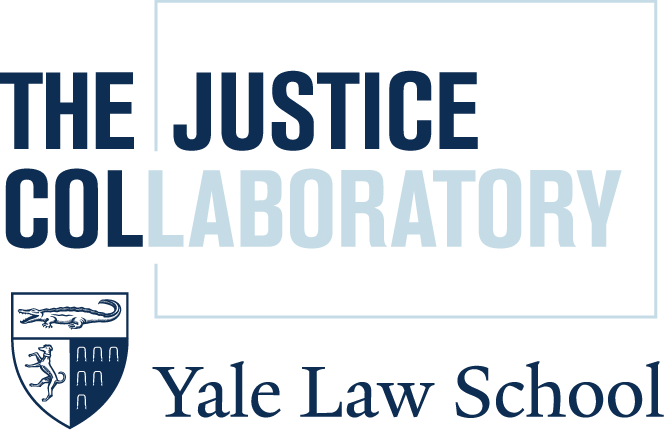Policing Post-Ferguson Conference: A symposium of the Justice Collaboratory
April 16-17, 2015
The Study, New Haven, Connecticut
This convening, sponsored by the Justice Collaboratory, explores how policing in the United States will and/or should be affected by the shooting of Michael Brown in Ferguson, Missouri, and the subsequent nationwide protests.
Co-sponsors include the American Constitution Society, the Arthur Liman Public Interest Program, the Asian Pacific American Law Student Association, the Black Law Students’ Association, the Institution for Social and Policy Studies at Yale University, the Latino Law Students’ Association, the Muslim Law Students’ Association, the Native American Law Students’ Association, OutLaws, the South Asian Law Students’ Association, the Women of Color Collective, and the Yale Law School Democrats.
Thursday, April 16
3:00-3:10pm Welcome to New Haven by Mayor Toni Harp
3:10-3:30pm Welcome to the Policing Post Ferguson Conference and Introduction of Keynote Speaker
Tracey Meares, Walton Hale Hamilton Professor of Law at Yale Law School
Tom Tyler, Macklin Fleming Professor of Law and Professor of Psychology at Yale Law School
Chief Dean Esserman, New Haven Police Department
3:30-4pm Keynote Remarks by Acting Assistant Attorney General for the Civil Rights Division Vanita Gupta
4:10-5:30pm Us and Them?: Police-Community Relations
Representatives from Muslim American, LGBTQ, disability rights, and victims’ rights organizations—among others—will discuss police relationships with their respective communities. Broadening the lens from the black civilian/white police officer divide that has deservedly been the subject of much recent focus, this panel will analyze police-community relations more broadly and offer thoughts on what will be required to bridge divides.
Sasha Alexander, Director of Membership, Sylvia Rivera Law Project
Leigh Ann Davis, Program Manager of Justice Initiatives, The Arc National Center on Criminal Justice and Disability
Chief Dean Esserman, New Haven Police Department
Mai Fernandez, Executive Director, National Center for Victims of Crime
Ramzi Kassem, Associate Professor of Law, CUNY School of Law
Susan Shah, Program Director, Center on Immigration and Justice, Vera Institute of Justice
Moderator: Vesla Weaver, Assistant Professor, Yale University
5:45-7 pm Hors D’Oeuvres and Conversation with Jill Leovy, LA Times reporter and author of the new book Ghettoside
Friday, April 17
10-11:45 am Broken Windows, Stop and Frisk, and Ferguson
The death of Eric Garner after he was placed in a chokehold during his arrest for selling loose cigarettes raised questions about if and how minor offenses should be policed. What is “broken windows” policing and how is it distinguishable from the stop-and-frisk tactics with which it is sometimes associated? What room does the broken windows philosophy make for using non-punitive interventions to resolve social disorder? Is broken windows policing normatively desirable and/or practically effective? In what direction will and should forward-thinking police departments move on these issues?
Hassan Aden, Director of Research and Programs, International Association of Chiefs of Police
Lisa Daugaard, Policy Director, The Public Defender Association
John J. Donohue III, C. Wendell and Edith M. Carlsmith Professor of Law, Stanford Law School
Thomas B. Harvey, Executive Director, Arch City Defenders
Forrest Stuart, Assistant Professor, University of Chicago
Moderator: Issa Kohler-Hausmann, Associate Professor of Law, Yale Law School
12-1pm Lunch Talk: Is Ferguson the Exception or the Rule?
Ferguson, Missouri has been described as a “suburban ghetto.” To whatever extent one agrees with this characterization, it is not unique to Ferguson. According to one academic, “about 40 percent of the nation’s 46 million poor live in suburbs, up from 20 percent in 1970.” Are the problems of Ferguson particular—arising out of a uniquely toxic stew of built up failings and resentments? Or are Ferguson’s problems America’s problems, playing out in cities and towns across the country?
Tracey Meares, Walton Hale Hamilton Professor of Law at Yale Law School
Terry Jones, Professor, University of Missouri - St. Louis
1-2:45 pm Civilian Oversight
Citizen complaint review boards, inspectors general, and body cameras have all been proposed as methods of holding police forces accountable to the public they serve. Which of these practices hold the most promise and what does the empirical research tell us about their benefits? How should we evaluate potential objections to body cameras, in particular, such as intrusions on officer and citizen privacy? How do communities evaluate which types of oversight, if any, are right for them? What should be the role of the federal government and of state and federal courts?
Philip Eure, Inspector General, New York Police Department
Hillary Potter, Associate Professor, University of Colorado, Boulder
Seema Sadanandan, Program Director, ACLU of the Nation’s Capital
Chuck Wexler, Executive Director, Police Executive Research Forum
Moderator: Kate Stith, Lafayette S. Foster Professor of Law, Yale Law School
3-4:45 pm The Future of Policing
Community policing is widely viewed as a way forward for police departments looking to improve relationships with those whom they police. But some critics contend that past efforts at community policing have brought funding to departments but not clearly defined what type of police work should ensue. What set of practices does the term denote and how can and should they be implemented? What innovative approaches to police work are needed to address our current challenges, which arguably include both unacceptable levels of violence and unacceptable levels of incarceration in communities of color? What should be the role of private philanthropy in equipping police departments to meet the challenges of the 21st Century, as described by the President’s Task Force in their recently-released Interim Report?
The Honorable Lee Brown, former Mayor of Houston, Texas
Jim Burch, Vice President of Strategic Initiatives, The Police Foundation
Tracie Keesee, Project Director, National Initiative for Building Community Trust and Justice
Andrew Papachristos, Associate Professor, Yale University
Nkechi Taifa, Senior Policy Analyst, Open Society Foundations
Moderator: James Forman, Jr., Clinical Professor of Law and Supervising Attorney, Yale Law School

